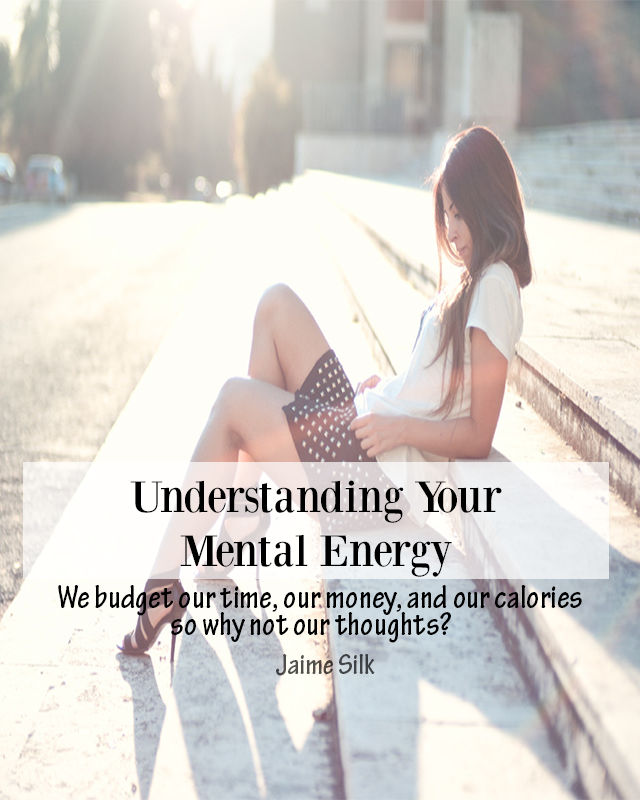
By: Jaime Silk
Fine, let your senses guide you, but your thoughts? No!
Have you ever taken a step back from your own thought processes and actually thought to yourself, “What do I think about?” That’s a little cognitive doozey, ain’t it? If you answered, “Yes” to this question, then perhaps you have gone as far to break down where you specifically allocate your mental energy (i.e. 40% on work; 25% on food; 30% on sex… what? Too much?!)?
Regardless of what stage of your twenties you’re in, your mental energy is a very important resource to inventory. We budget our time, our money, and our calories so why not our thoughts? These computations are inevitably less specific calculations; however, they can still be guesstimated with useful accuracy in order to ensure you are mindfully leading a thoughtful design of your life with intention and choice.
When you wake up at the ripe age of 30 and crossover and out of the twenty-something age zone, you probably want your life to be a certain way, right? My last article stated that Life Will Hand You Lemons, but to the best of your ability, let your thinking pave the way for good choices so you – at least roughly – end up where you want to be at the end of your twenties.
Before any successful plans or designs of any kind are implemented, there a few things that happen. There are ideas, concepts, research, and maps put forth that go into both small and big picture executions. Note that most good plans involve consulting professionals. Designing your life and your lifestyle is crucial during your twenty-something years for a few reasons.

Photo via Daniel Zedda
Allow me to justify my argument through a personal experience followed by a professional fact through my work as a therapist:
1. Personal Experience
I discovered the importance of laying solid decision making and thought out foundations to my lifestyle design the hard way. I have come to accept that I am one of those people who has this as a dominant learning style. Some of you may be visual learners; others of you are kinesthetic learners. Me? I’m a hard way learner.
I spent a lot of time in my early twenties thinking about others: how can I be more accommodating?, how can make others happy?, how can be sensitive to social dynamics?, etc. I did not realize how much of my mental resources I was literally pouring into thoughts of that nature. Now, don’t get me wrong, I derived a lot of joy for serving others in a number of ways, but what I was naïve to was what the return on my investment (ROI) these types of thoughts would bring me.
People commonly say, “You are what you eat” which I believe also applies to, “You become what you think.”
For me, I became overly concerned with what others thought of me and spent far too much time worrying. These cognitive resources could have been much better applied to other areas of my life. When anxiety and stress are the fruits of your psychological labor, you are in the wrong line of mental work!
Let me explain my realization one step further.
Because I was not keeping tabs on how much thought I was putting towards friends, socially-related things, and people pleasing, I was shocked when I tried to turn these thought patterns around. It turns out the more I thought about others, the more my thoughts translated into behaviors for others. And the more my behaviors were geared in the directions of these thoughts, the more people expected me to cater to them.
One may assume that perhaps gratitude would be the result? Sometimes, absolutely yes. But overall I fell into the unintentional trap of investing far too much of my thoughts towards things that were useless and really put me in a lifestyle that I did not want to continue.
Again, I did not intend to direct my thinking this way, I simply did not think about the intentions of my thoughts (another doozy). If you do not think about investing your thoughts properly, the ROI will likely not be pretty.
2. Professional Fact
Research shows that your brain demonstrates better neuroplasticity in your twenties which means the actual hardwiring of your thinking patterns and subsequent behaviors are much easier to train during twenty-something years.
Just as language is acquired more easily before the age of seven, changing and solidifying thought and behavioral patterns is easier if you condition it pre-thirty. As a therapist, I so often hear people say, “Why does this keep happening?” This is when I suggest a thought budget or thought record to them.
The result: people are amazed how much their thoughts guide their behaviors which puts them in circumstances they claim to not want to be in but constantly find themselves returning to. They are letting their thoughts guide them and not choosing to guide their thoughts.
Looking for a little back-to-school/work/life/reality as you transition into fall? Get out your pen and paper and give yourself a little mental check in to where you invest your valuable thought patterns and mental energy. Examine your results and take time to think about how you think and if some changes could be made.
If you want to think in healthier more constructive ways, there a number of great written and human resources out there. If abnormal or overly negative thoughts become overwhelming I suggest seeing a therapist; I have heard many people share the great notion that the mind can be a scary neighborhood, you don’t have to walk it alone. Most importantly though, don’t let your thoughts guide you: guide them.
Jaime Silk
Mental Health & Wellness Therapist
www.everydaywellnesstherapy.
